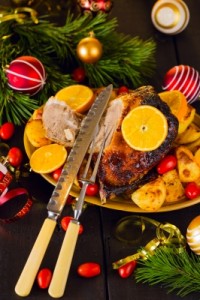During the holiday season, many people experience weight gain due to overeating. Avoid this by following these five ways to avoid overeating this holiday season, written by Advanced Neurotherapy's very own health coach Shayna Strickland!
 1. Chew. When it comes to increased health, it’s not just what we
1. Chew. When it comes to increased health, it’s not just what we
eat, but how we eat. Digestion actually begins in the mouth, where contact with our teeth and digestive enzymes in our saliva break down food. But these days most of us rush through the whole eating experience, barely acknowledging what we’re putting in our mouths. We eat while distracted—over the holidays that generally means talking—and we swallow our food practically whole. On average we chew each bite only eight times. It’s no wonder that many people have digestive problems.
There are many great reasons to slow down and chew your food. Saliva breaks down food into simple sugars, creating a sweet taste. The more we chew, the sweeter our food becomes, so we don’t crave those after-meal sweets. Chewing reduces digestive distress and improves assimilation, allowing our bodies to absorb maximum nutrition from each bite of food. More chewing produces more endorphins, the brain chemicals responsible for creating good feelings. Chewing is also helpful for weight loss, because when we are chewing well, we are more able to feel when we are full. In fact, chewing can promote healing and circulation, enhance immunity, increase energy and endurance, improve skin health, and stabilize weight.
2. Drink water a half hour before eating. By drinking a glass or two (8-16 oz) of water a half hour before you eat, you are filling your stomach but not diluting digestive enzymes. Your stomach will be fuller, which will help prevent you from eating too much.
 3. Minimize or skip the sides. Side dishes often have more sugar, fat, and calories than the main portion of the meal, so try to focus on that turkey and minimize the maple sweet potato and green beans drowned in butter. Opt for steamed or fresh sides when possible.
3. Minimize or skip the sides. Side dishes often have more sugar, fat, and calories than the main portion of the meal, so try to focus on that turkey and minimize the maple sweet potato and green beans drowned in butter. Opt for steamed or fresh sides when possible.
4. Skip seconds. Fill your plate once. You can even pile it on if you feel the need! You can only fit so much food piled onto one plate, where as you can fit a whole lot more on 2 plates. Start with one plate and stop there. This goes for desserts too, though I certainly do not recommend piling desserts on your plate.
5. If you must have dessert, small portions are key. If you are someone who can not go without eating desserts, especially when there is an abundance, then acknowledge this to be true going in, and eat less dinner to leave room, and calories, for those desserts. If you are not generally a dessert person or are trying to avoid them, eat enough dinner that you are full and your body doesn’t want/need dessert. If you are going to have dessert, small portions are key! Also, try to pick healthier sweet options, like fruit, rather than high sugar, high calorie options.
First image courtesy of digidreamgrafix at FreeDigitalPhotos.net
Second image courtesy of Serge Bertasius Photography at FreeDigitalPhotos.net








